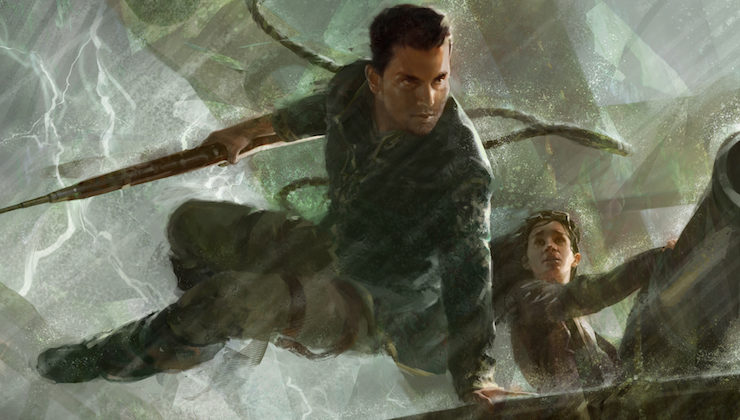For two decades, Jim Killen has served as the science fiction and fantasy book buyer for Barnes & Noble. Every month on Tor.com and the B&N Sci-Fi & Fantasy Blog, Jim shares his curated list of the month’s best science fiction & fantasy books.
Dragon Road, by Joseph Brassey
(May 1, Angry Robot—Paperback)
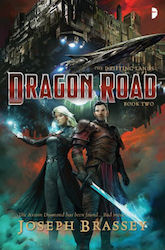 Brassey returns to the world of Skyfarer, the city-sized ship Iseult, and the story of portal mage Harkon, his apprentice Aimee de Laurent, and new recruit Elias. The ship needs to appoint a new captain, but no single candidate in the officer’s court has enough support, so Harkon is called in to render. Politics in the court are ruthless and complicated, and their task is made more ominous by Elias’ dark dreams of an ancient terror slowly making its way through the ship, intent on sending millions of people to their deaths. The crew doesn’t quite accept Elias—formerly known as Lord Azreal, Lord Commander of the Eternal Order, before being saved and recruited by Harkon in the first book in this fabulously entertaining science fantasy series—which makes a complex challenge even more difficult, and the danger, all the greater.
Brassey returns to the world of Skyfarer, the city-sized ship Iseult, and the story of portal mage Harkon, his apprentice Aimee de Laurent, and new recruit Elias. The ship needs to appoint a new captain, but no single candidate in the officer’s court has enough support, so Harkon is called in to render. Politics in the court are ruthless and complicated, and their task is made more ominous by Elias’ dark dreams of an ancient terror slowly making its way through the ship, intent on sending millions of people to their deaths. The crew doesn’t quite accept Elias—formerly known as Lord Azreal, Lord Commander of the Eternal Order, before being saved and recruited by Harkon in the first book in this fabulously entertaining science fantasy series—which makes a complex challenge even more difficult, and the danger, all the greater.
Medusa Uploaded, by Emily Devenport
(May 1, Tor Books—Paperback)
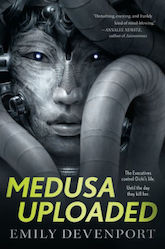 Oichi is a domestic servant on the generation ship Olympia, cybernetically-modified so that most of her sensory input is diverted to the Executives who run society. Partially blind, deaf, and mute, she is assisted by a link to a powerful AI, known as a Medusa, that “feeds” her sensory data from time to time. Oichi is more than she seems, however; her parents were killed when the Executives destroyed the Olympia’s sister ship—punishment for their subversive work attempting to transmit information that would enable anyone to bond with a Medusa, transforming the way of life onboard the immense starship. After she survives an attempted assassination, Oichi is officially declared dead, leaving her free to begin the methodical, bloody work of killing those in power and fomenting a revolution, even as she learns more about her own identity and the ship’s true mission. This sharp-edged novel from a Philip K. Dick Award-winner Davenport (Broken Time, written under a pseudonym) is a revenge thriller told from a unique and unforgettable point-of-view.
Oichi is a domestic servant on the generation ship Olympia, cybernetically-modified so that most of her sensory input is diverted to the Executives who run society. Partially blind, deaf, and mute, she is assisted by a link to a powerful AI, known as a Medusa, that “feeds” her sensory data from time to time. Oichi is more than she seems, however; her parents were killed when the Executives destroyed the Olympia’s sister ship—punishment for their subversive work attempting to transmit information that would enable anyone to bond with a Medusa, transforming the way of life onboard the immense starship. After she survives an attempted assassination, Oichi is officially declared dead, leaving her free to begin the methodical, bloody work of killing those in power and fomenting a revolution, even as she learns more about her own identity and the ship’s true mission. This sharp-edged novel from a Philip K. Dick Award-winner Davenport (Broken Time, written under a pseudonym) is a revenge thriller told from a unique and unforgettable point-of-view.
Black Helicopters, by Caitlin R. Kiernan
(May 1, Tor Books—Paperback)
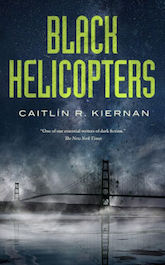 An expanded version of a novella previously nominated for a World Fantasy Award, Black Helicopters is set in a world where logic and the laws of nature seem to be decaying. Off the coast of Maine, huge monstrosities appear, and head inland. Forces assemble to hold back the darkness, among them Sixty-Six, the scion of a CIA experiment, while across the ocean in Dublin, an immortal secret agent tracks down twin sisters with incredible powers to recruit them for the cause. As the world descends into paranoia and chaos, buried connections come to light that change everything. As a companion piece to the fungal horror of 2016’s Agents of Dreamland, this novella doesn’t disappoint.
An expanded version of a novella previously nominated for a World Fantasy Award, Black Helicopters is set in a world where logic and the laws of nature seem to be decaying. Off the coast of Maine, huge monstrosities appear, and head inland. Forces assemble to hold back the darkness, among them Sixty-Six, the scion of a CIA experiment, while across the ocean in Dublin, an immortal secret agent tracks down twin sisters with incredible powers to recruit them for the cause. As the world descends into paranoia and chaos, buried connections come to light that change everything. As a companion piece to the fungal horror of 2016’s Agents of Dreamland, this novella doesn’t disappoint.
The Poppy War, by R.F. Kuang
(May 1, Harper Voyager—Hardcover)
 In a world inspired by the recent history and culture of China, the Nikan Empire defeated the Federation of Mugen in the Second Poppy War, and the two countries have since coexisted in a fragile state of peace. Orphaned peasant girl Rin lives a life of misery in Nikan, but when she sits for the Keju, the empire-wide examination designed to find talented youth and assign them to serve where they will be most useful, she scores in the highest percentile and is shocked to be assigned to the prestigious Sinegard military school, home to the children of the Empire’s elite. At Sinegard, Rin is bullied for her dark skin and low social status—but with the help of an insane teacher, she also discovers she is a shaman, able to wield powers long thought lost to the world. As she grows into her power and communicates with living gods, Rin sees clearly that a third Poppy War is coming—and she may be the only one who can stop it. The author is a Chinese-American, and the book’s worldbuilding is informed by her study of twentieth century Chinese history. And did we mention she hasn’t even graduated from college yet? The “year’s best debut” buzz around this one was warranted; it really is that good.
In a world inspired by the recent history and culture of China, the Nikan Empire defeated the Federation of Mugen in the Second Poppy War, and the two countries have since coexisted in a fragile state of peace. Orphaned peasant girl Rin lives a life of misery in Nikan, but when she sits for the Keju, the empire-wide examination designed to find talented youth and assign them to serve where they will be most useful, she scores in the highest percentile and is shocked to be assigned to the prestigious Sinegard military school, home to the children of the Empire’s elite. At Sinegard, Rin is bullied for her dark skin and low social status—but with the help of an insane teacher, she also discovers she is a shaman, able to wield powers long thought lost to the world. As she grows into her power and communicates with living gods, Rin sees clearly that a third Poppy War is coming—and she may be the only one who can stop it. The author is a Chinese-American, and the book’s worldbuilding is informed by her study of twentieth century Chinese history. And did we mention she hasn’t even graduated from college yet? The “year’s best debut” buzz around this one was warranted; it really is that good.
Only Human, by Sylvain Neuvel
(May 1, Del Rey—Hardcover)
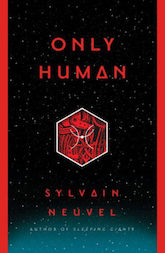 The conclusion to the Themis Files trilogy opens, our heroes—a group of scientists led by the brilliant Rose Franklin, whose life has been defined by her childhood discovery of a giant robotic arm buried deep in the earth—have been transported to the distant planet Esat Ekt inside of the giant machine they assembled together, having successfully used it to ward off a robotic invasion from deep space. In the wake of violence, Rose found life among the Ekt to be peaceful and pleasant, she returns to Earth 10 years later to find it worse off than when she left, the United States and Russia at the brink of war. Russian agent Katherine Lebedev sees in the giant robot that was used to defend the planet—called Themis—a weapon that could subdue enemy nations, but she needs Rose’s help to make that happen—and is willing to do anything to persuade her. Rose recoils from what she sees as an intentional attempt by the whole human race to “lobotomize” itself, and as the world sinks into a quagmire of war and spiraling chaos, she races to find a way to stop the horror without becoming a pawn in a doomsday game. Presented as a form of found documents and interview transcripts, this trilogy has put a new twist on sci-fi tropes, and the ending is just as exciting and explosive as you could ask for.
The conclusion to the Themis Files trilogy opens, our heroes—a group of scientists led by the brilliant Rose Franklin, whose life has been defined by her childhood discovery of a giant robotic arm buried deep in the earth—have been transported to the distant planet Esat Ekt inside of the giant machine they assembled together, having successfully used it to ward off a robotic invasion from deep space. In the wake of violence, Rose found life among the Ekt to be peaceful and pleasant, she returns to Earth 10 years later to find it worse off than when she left, the United States and Russia at the brink of war. Russian agent Katherine Lebedev sees in the giant robot that was used to defend the planet—called Themis—a weapon that could subdue enemy nations, but she needs Rose’s help to make that happen—and is willing to do anything to persuade her. Rose recoils from what she sees as an intentional attempt by the whole human race to “lobotomize” itself, and as the world sinks into a quagmire of war and spiraling chaos, she races to find a way to stop the horror without becoming a pawn in a doomsday game. Presented as a form of found documents and interview transcripts, this trilogy has put a new twist on sci-fi tropes, and the ending is just as exciting and explosive as you could ask for.
Song of Blood and Stone, by L. Penelope
(May 1, St. Martin’s Press—Hardcover)
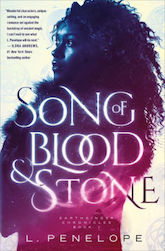 In the land of Elsira, Jasminda is an outcast due to her dark skin and her Earthsong powers, which are feared and shunned. Living alone, she’s powerless to stop a group of soldiers from invading her cabin to use as shelter, and bringing with them an injured spy whose mission was to prove that the Mantle between Elsira and the land of Lagrimar is failing—and that an ancient evil, growing in power, threatens to return. The spy, Jack, accomplished his mission, but must carry his findings back to his masters in order to save Elsira and its people. When Jasminda meets Jack, she’s smitten, and risks healing him with her Earthsong. The pair escape the cabin and head off on a dangerous quest for knowledge necessary to save the world, but navigating a place where neither is welcome or trusted means they must trust each other totally—and both carry secrets that could ruin everything. This debut, which won awards when originally self-published, introduces an exciting new voice to the wider world of fantasy readers.
In the land of Elsira, Jasminda is an outcast due to her dark skin and her Earthsong powers, which are feared and shunned. Living alone, she’s powerless to stop a group of soldiers from invading her cabin to use as shelter, and bringing with them an injured spy whose mission was to prove that the Mantle between Elsira and the land of Lagrimar is failing—and that an ancient evil, growing in power, threatens to return. The spy, Jack, accomplished his mission, but must carry his findings back to his masters in order to save Elsira and its people. When Jasminda meets Jack, she’s smitten, and risks healing him with her Earthsong. The pair escape the cabin and head off on a dangerous quest for knowledge necessary to save the world, but navigating a place where neither is welcome or trusted means they must trust each other totally—and both carry secrets that could ruin everything. This debut, which won awards when originally self-published, introduces an exciting new voice to the wider world of fantasy readers.
Fury from the Tomb, by S.A. Sidor
(May 1, Angry Robot—Paperback)
 As the first entry in The Institute for Singular Antiquities series begins, Romulus Hardy is a young Egyptologist digging into ruins at Saqqara in 1888. While seeking the tomb of an ancient sorcerer, he and his team unearth five coffins and a disturbingly large sarcophagus. The career-making discovery turns sour, however—curses will do that. The expedition suffers from a classic mummy’s tomb-style consequences, leaving everyone but Rom dead in short order. He returns to America with the coffins in order to deliver them to his wealthy, reclusive sponsor, but his train is hijacked by ghouls—yes, ghouls—and the mummies are taken to Mexico. Rom must suit up and team up with a band of misfits to head south and bring them back—but they quickly discover they’re up against a lot more than some bandits. There are vampires, evil monks, monsters, and gunslingers lurking about, and as Rom’s mission grows increasingly wild—and increasingly dangerous, the book only grows more compulsively readable.
As the first entry in The Institute for Singular Antiquities series begins, Romulus Hardy is a young Egyptologist digging into ruins at Saqqara in 1888. While seeking the tomb of an ancient sorcerer, he and his team unearth five coffins and a disturbingly large sarcophagus. The career-making discovery turns sour, however—curses will do that. The expedition suffers from a classic mummy’s tomb-style consequences, leaving everyone but Rom dead in short order. He returns to America with the coffins in order to deliver them to his wealthy, reclusive sponsor, but his train is hijacked by ghouls—yes, ghouls—and the mummies are taken to Mexico. Rom must suit up and team up with a band of misfits to head south and bring them back—but they quickly discover they’re up against a lot more than some bandits. There are vampires, evil monks, monsters, and gunslingers lurking about, and as Rom’s mission grows increasingly wild—and increasingly dangerous, the book only grows more compulsively readable.
Uncharted, by Kevin J. Anderson and Sarah A. Hoyt
(May 8, Baen—Hardcover)
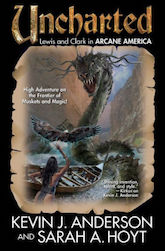 Anderson and Hoyt reimagine the journey of Lewis and Clark in the context of an alternate history wherein a magical battle in 1759 not only destroyed Halley’s Comet but also caused the Sundering, a magical separation of the New World from the Old. Cut off from Europe. the colonists in America discover new magical abilities—but face an untamed continent, where powers beyond their understanding stir and grow. When the old wizard Ben Franklin is attacked by a fire-breathing dragon, he hires Meriwether Lewis and his partner Will Clark to head into the Arcane Territories west of the Mississippi and find the source of the danger. It’s a mission of exploration and first contact with indigenous tribes that could possibly pierce the magical veil separating them from the rest of the world, or expose them to an even greater evil. Alternate histories don’t come more imaginative or action-packed.
Anderson and Hoyt reimagine the journey of Lewis and Clark in the context of an alternate history wherein a magical battle in 1759 not only destroyed Halley’s Comet but also caused the Sundering, a magical separation of the New World from the Old. Cut off from Europe. the colonists in America discover new magical abilities—but face an untamed continent, where powers beyond their understanding stir and grow. When the old wizard Ben Franklin is attacked by a fire-breathing dragon, he hires Meriwether Lewis and his partner Will Clark to head into the Arcane Territories west of the Mississippi and find the source of the danger. It’s a mission of exploration and first contact with indigenous tribes that could possibly pierce the magical veil separating them from the rest of the world, or expose them to an even greater evil. Alternate histories don’t come more imaginative or action-packed.
King of Ashes, by Raymond E. Feist
(May 8, Harper Voyager—Harcover)
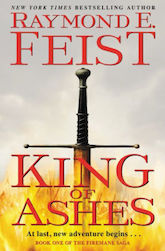 Feist’s first foray outside the universe of The Riftwar Saga begins in bloody fashion, as Baron Daylon Dumarch betrays his liege, King Steveren Langene of Ithrace, known as Firemane. Dumarch believes he is trading his king’s life for his own family’s safety, but he quickly comes to regret his betrayal when the five kingdoms of the world are plunged into the abyss of war, and Ithrace is destroyed. When a child that may be Firemane’s heir is left with Dumarch, now a kingless free lord, he has a chance to make amends and chooses to raise and protect the boy in secret. Meanwhile, another child of mysterious origin, Declan, grows up as a blacksmith’s apprentice, and somehow unlocks the ancient secret of forging what’s known as King’s Steel—putting his life in danger. Forced to flee, Declan and the unknowing heir to Ithrace’s throne find their fates colliding, and leading them towards a terrible secret.
Feist’s first foray outside the universe of The Riftwar Saga begins in bloody fashion, as Baron Daylon Dumarch betrays his liege, King Steveren Langene of Ithrace, known as Firemane. Dumarch believes he is trading his king’s life for his own family’s safety, but he quickly comes to regret his betrayal when the five kingdoms of the world are plunged into the abyss of war, and Ithrace is destroyed. When a child that may be Firemane’s heir is left with Dumarch, now a kingless free lord, he has a chance to make amends and chooses to raise and protect the boy in secret. Meanwhile, another child of mysterious origin, Declan, grows up as a blacksmith’s apprentice, and somehow unlocks the ancient secret of forging what’s known as King’s Steel—putting his life in danger. Forced to flee, Declan and the unknowing heir to Ithrace’s throne find their fates colliding, and leading them towards a terrible secret.
Death Doesn’t Bargain, by Sherrilyn Kenyon
(May 8, Tor Books—Hardcover)
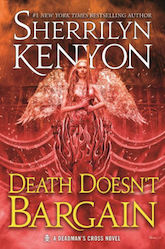 The second in Kenyon’s Dead Man’s Cross series finds the world in grave peril, beset by the demonic forces that have broken free of their enchanted prison to plot the downfall of mankind. Vine is the worst of them, and Kalder Dupree his prisoner, and having sacrificed himself to save his shipmates, he expects no rescue, and no mercy. But Cameron Jack, a Hellchaser, plans to offer him both both—she can’t sit idly by and see a man punished for doing the right thing. Cameron is willing to commit her own terrible acts of destruction to rescue Dupree. Vine is powerful, but she may have met her match in this Hellchaser on a mission.
The second in Kenyon’s Dead Man’s Cross series finds the world in grave peril, beset by the demonic forces that have broken free of their enchanted prison to plot the downfall of mankind. Vine is the worst of them, and Kalder Dupree his prisoner, and having sacrificed himself to save his shipmates, he expects no rescue, and no mercy. But Cameron Jack, a Hellchaser, plans to offer him both both—she can’t sit idly by and see a man punished for doing the right thing. Cameron is willing to commit her own terrible acts of destruction to rescue Dupree. Vine is powerful, but she may have met her match in this Hellchaser on a mission.
The Rig, by Roger Levy
(May 8, Titan Books—Paperback)
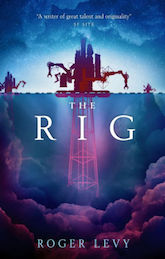 The human race has reached the stars and settled on distant planets, and all but abandoned religion along the way—just one planet, Gehenna, clings to a spiritual belief system. Instead of belief in an afterlife, the rest of humanity has AfterLife, a social media network where people can (thanks to omnipresent surveillance) watch replays of every moment in a dead person’s life like a TV show, and vote on whether they want that person to be resurrected. On the planet Bleak, a police officer looking into a string of murders is almost the final victim, events that him morbidly fascinated with death. He goes to work on The Rig, where the winners of AfterLife are placed in suspended animation deep under the sea. Meanwhile, a writer named Raisa begins investigating the murders—leading to a story with implications stretching across space to every human-settled planet. And on the devout planet Gehenna, a young boy genius meets a sociopath, setting in motion a complex string of events that lead back to the Rig. This is meaty literary SF in the David Mitchell vein, but weirder and more far-flung in its storytelling.
The human race has reached the stars and settled on distant planets, and all but abandoned religion along the way—just one planet, Gehenna, clings to a spiritual belief system. Instead of belief in an afterlife, the rest of humanity has AfterLife, a social media network where people can (thanks to omnipresent surveillance) watch replays of every moment in a dead person’s life like a TV show, and vote on whether they want that person to be resurrected. On the planet Bleak, a police officer looking into a string of murders is almost the final victim, events that him morbidly fascinated with death. He goes to work on The Rig, where the winners of AfterLife are placed in suspended animation deep under the sea. Meanwhile, a writer named Raisa begins investigating the murders—leading to a story with implications stretching across space to every human-settled planet. And on the devout planet Gehenna, a young boy genius meets a sociopath, setting in motion a complex string of events that lead back to the Rig. This is meaty literary SF in the David Mitchell vein, but weirder and more far-flung in its storytelling.
Blood Orbit, by K.R. Richardson
(May 8, Prometheus Books—Paperback)
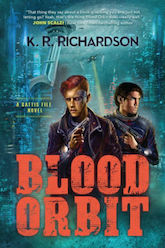 On the planet Gattis, owned by a corporation and populated by two native races, the Dreihleen and the Ohba, rookie cop Eric Matheson arrives in defiance of his corporate family and immediately finds himself assigned to a pressure-cooker case: 16 murdered Dreihleen in a slum of the capital city Angra Dastrelas, and the accused killer is an Ohba. Together with his cybernetically-enhanced partner J.P. Dillal, who is half Dreihleen, Matheson must navigate a case that is inflaming rebellion against the corporation, heavy pressure from his superiors, and the growing knowledge that if things on the ground get out of hand, the corporation might choose to simply destroy both populations in a horrific, but efficient, genocide. When you’re a cop whose job is enforcing corporate policy instead of coherent laws, upholding justice is impossible. This is lean, mean noir storytelling in a science-fictional setting, and will satisfy fans of either genre.
On the planet Gattis, owned by a corporation and populated by two native races, the Dreihleen and the Ohba, rookie cop Eric Matheson arrives in defiance of his corporate family and immediately finds himself assigned to a pressure-cooker case: 16 murdered Dreihleen in a slum of the capital city Angra Dastrelas, and the accused killer is an Ohba. Together with his cybernetically-enhanced partner J.P. Dillal, who is half Dreihleen, Matheson must navigate a case that is inflaming rebellion against the corporation, heavy pressure from his superiors, and the growing knowledge that if things on the ground get out of hand, the corporation might choose to simply destroy both populations in a horrific, but efficient, genocide. When you’re a cop whose job is enforcing corporate policy instead of coherent laws, upholding justice is impossible. This is lean, mean noir storytelling in a science-fictional setting, and will satisfy fans of either genre.
Afterwar, by Lilith Saintcrow
(May 8, Orbit—Paperback)
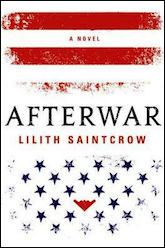 Saintcrow begins this story where many books about the Second American Civil War would end: the hostilities are over, the fascist government has fallen, and the prison camps have been liberated. But the true struggle is just beginning: the devastation of a war that set citizens against each other means that the rebuilding won’t be simple, nor will be the repair of social bonds destroyed beyond recognition by years of conflict and propaganda. Swann and his Riders served in the bloodiest parts of the war, and now hunt war criminals for the new Federal Government. Their latest quarry carries something that could destroy the fledgling government and upset the delicate peace that’s been imposed, putting the soldiers right back in the midst of a bloody battle for freedom and justice.
Saintcrow begins this story where many books about the Second American Civil War would end: the hostilities are over, the fascist government has fallen, and the prison camps have been liberated. But the true struggle is just beginning: the devastation of a war that set citizens against each other means that the rebuilding won’t be simple, nor will be the repair of social bonds destroyed beyond recognition by years of conflict and propaganda. Swann and his Riders served in the bloodiest parts of the war, and now hunt war criminals for the new Federal Government. Their latest quarry carries something that could destroy the fledgling government and upset the delicate peace that’s been imposed, putting the soldiers right back in the midst of a bloody battle for freedom and justice.
Season of Storms, by Andrzej Sapkowski
(May 8, Orbit—Hardcover)
 After a prolonged absence from long-form fiction, Geralt of Rivia, a.k.a. The Witcher, returns in a tale set before the events of the short story “The Witcher.” Geralt gains even more renown as a monster hunter when he kills an idr, using people as bait—but failing to protect them all in the process. With his reputation at an all-time high, he raises his fees, but finds himself accused of stealing from the crown and thrown into jail. When he finally secures his release, he learns that his steel and silver swords—the tools of a Witcher—have been stolen, and he sets off on a quest to retrieve them. This, of course, proves more difficult than it should be—and now that he’s without his weapons, his enemies are gathering like storm clouds on the horizon.
After a prolonged absence from long-form fiction, Geralt of Rivia, a.k.a. The Witcher, returns in a tale set before the events of the short story “The Witcher.” Geralt gains even more renown as a monster hunter when he kills an idr, using people as bait—but failing to protect them all in the process. With his reputation at an all-time high, he raises his fees, but finds himself accused of stealing from the crown and thrown into jail. When he finally secures his release, he learns that his steel and silver swords—the tools of a Witcher—have been stolen, and he sets off on a quest to retrieve them. This, of course, proves more difficult than it should be—and now that he’s without his weapons, his enemies are gathering like storm clouds on the horizon.
Side Life, by Steve Toutonghi
(May 8, SoHo Press—Hardcover)
 When Vin is fired as CEO of the tech firm he founded—one more indignity in his life’s recent downward spiral—he lands a fascinating side-gig house-sitting for a mysterious, revered genius who has gone missing. Vin finds himself drawn to the mystery of where Nerdean has gone and what he’s working on, and his curiosity leads him to the discovery of a basement laboratory containing three casket-like receptacles—one of which contains a woman in apparent suspended animation. Vin gets inside one of the remaining devices, and experiences what he first thinks is a form of lucid dream in which he shares and controls the body of Winston Churchill. But when he emerges, he finds his reality altered in fundamental ways. Already in a bad place, Vin begins to use the power of Nerdean’s invention to reshape reality for his benefit without care for the damage he’s doing or the lives he’s destroying—if, that is, he isn’t just imagining it all. It’s a brain-teasing take on time travel and parallel universes from the author of Join.
When Vin is fired as CEO of the tech firm he founded—one more indignity in his life’s recent downward spiral—he lands a fascinating side-gig house-sitting for a mysterious, revered genius who has gone missing. Vin finds himself drawn to the mystery of where Nerdean has gone and what he’s working on, and his curiosity leads him to the discovery of a basement laboratory containing three casket-like receptacles—one of which contains a woman in apparent suspended animation. Vin gets inside one of the remaining devices, and experiences what he first thinks is a form of lucid dream in which he shares and controls the body of Winston Churchill. But when he emerges, he finds his reality altered in fundamental ways. Already in a bad place, Vin begins to use the power of Nerdean’s invention to reshape reality for his benefit without care for the damage he’s doing or the lives he’s destroying—if, that is, he isn’t just imagining it all. It’s a brain-teasing take on time travel and parallel universes from the author of Join.
The Soldier: Rise of the Jain, Book One, by Neal Asher
(May 15, Night Shade Books—Hardcover)
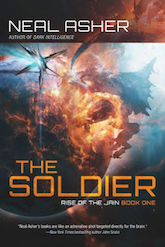 Asher’s new series within the Polity universe centers on the accretion disk, a designed solar system left behind by the terrifying, civilization-devouring Jain and littered with their deadly technology. Orlandine, a human-AI hybrid known as a haiman, and Dragon, a massive, sentient alien artifact of a vanished race with an intense hatred of the Jain, head to the disk to investigate while the human polity and the crablike prador wait suspiciously on the sidelines, each determined to ensure the other nation does not gain control of the Jain technology. The Polity is one of the most compelling areas in space opera, a sort of dark mirror version of the Culture, and this book offers a great opportunity for new readers to jump in with both feet.
Asher’s new series within the Polity universe centers on the accretion disk, a designed solar system left behind by the terrifying, civilization-devouring Jain and littered with their deadly technology. Orlandine, a human-AI hybrid known as a haiman, and Dragon, a massive, sentient alien artifact of a vanished race with an intense hatred of the Jain, head to the disk to investigate while the human polity and the crablike prador wait suspiciously on the sidelines, each determined to ensure the other nation does not gain control of the Jain technology. The Polity is one of the most compelling areas in space opera, a sort of dark mirror version of the Culture, and this book offers a great opportunity for new readers to jump in with both feet.
Ascendant, by Jack Campbell
(May 15, Ace—Hardcover)
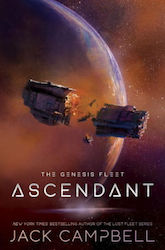 Campbell’s second Genesis Fleet novel opens three years after the unsuccessful attack by rebel forces on the planet Glenlyon, where Rob Geary and former marine Mele Darcy led the defense. Tensions have only increased since, however; Glenlyon is cut off from the rest of space by a blockade, and after a disaster that sees one of their warships destroyed, the planet only has one remaining vessel to defend it from future attacks. Geary makes a fateful decision to use the ship to provide security for a diplomatic mission to nearby star Kosatka, facing its own problem with a group of supposed rebels who aren’t what they seem. When a “peacekeeping” force made up of enemy soldiers arrives, things look grim for everyone. This prequel series to Campbell’s Lost Fleet saga offers fascinating backstory, but also stands alone nicely.
Campbell’s second Genesis Fleet novel opens three years after the unsuccessful attack by rebel forces on the planet Glenlyon, where Rob Geary and former marine Mele Darcy led the defense. Tensions have only increased since, however; Glenlyon is cut off from the rest of space by a blockade, and after a disaster that sees one of their warships destroyed, the planet only has one remaining vessel to defend it from future attacks. Geary makes a fateful decision to use the ship to provide security for a diplomatic mission to nearby star Kosatka, facing its own problem with a group of supposed rebels who aren’t what they seem. When a “peacekeeping” force made up of enemy soldiers arrives, things look grim for everyone. This prequel series to Campbell’s Lost Fleet saga offers fascinating backstory, but also stands alone nicely.
By Fire Above, by Robyn Bennis
(May 15, Tor Books—Hardcover)
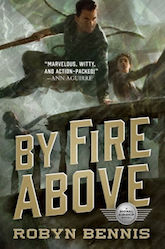 Bennis’ second Signal Airship novel opens with Captain Josette Dupre and the airship crew of the Mistral in the capital city of Kuchin for refitting. Assigned a foppish noble (and his handsome older brother) as an advisor, Dupre must navigate the ridiculous but dangerous waters of court, and barely survives a royal audience. When her hometown of Durum is captured by the Vinzhalian army—making her own mother a prisoner of war—Dupre must use her newfound knowledge of politics to secure support for a mission of liberation. Launching a rescue mission will mean dealing with raw recruits, scant supplies, and hints of treason and betrayal. Bennis breathes new life into the steampunk genre with a book that blends wall-to-wall action with well-rounded, fascinating characters.
Bennis’ second Signal Airship novel opens with Captain Josette Dupre and the airship crew of the Mistral in the capital city of Kuchin for refitting. Assigned a foppish noble (and his handsome older brother) as an advisor, Dupre must navigate the ridiculous but dangerous waters of court, and barely survives a royal audience. When her hometown of Durum is captured by the Vinzhalian army—making her own mother a prisoner of war—Dupre must use her newfound knowledge of politics to secure support for a mission of liberation. Launching a rescue mission will mean dealing with raw recruits, scant supplies, and hints of treason and betrayal. Bennis breathes new life into the steampunk genre with a book that blends wall-to-wall action with well-rounded, fascinating characters.
Armistice, by Lara Elena Donnelly
(May 15, Tor Books—Paperback)
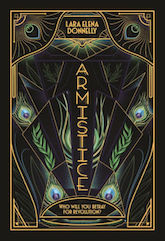 Book 2 in the Amberlough Dossier moves from smoky nightclubs to the glamor of filmmaking for another steamy spy thriller, set three years after the events of the Nebula-nominated Amberlough. Spy Cyril DePaul is gone, and the fascist One State Party (known as the Ospies) have taken control, “uniting” by force the four countries of Gedda, and, in the process, birthing a robust. Cordelia Lehane leads one of the resistance groups with bomb-throwing passion. After she is forced to flee Gedda, she teams up with Cyril’s ex-lover, expat Aristide Makricosta, currently making films in the tropical paradise of Porcharis. Cyril DePaul’s sister Lillian is pressed into service by the government, compelled to seduce one of the missing Cyril’s colleagues under threat to her young son. As each character plots—whether to return to Gedda, or to escape the Ospies—they crash into each other in unexpected ways, forced to trust the untrustworthy in a world riddled with spies, suspicion, and double-crosses.
Book 2 in the Amberlough Dossier moves from smoky nightclubs to the glamor of filmmaking for another steamy spy thriller, set three years after the events of the Nebula-nominated Amberlough. Spy Cyril DePaul is gone, and the fascist One State Party (known as the Ospies) have taken control, “uniting” by force the four countries of Gedda, and, in the process, birthing a robust. Cordelia Lehane leads one of the resistance groups with bomb-throwing passion. After she is forced to flee Gedda, she teams up with Cyril’s ex-lover, expat Aristide Makricosta, currently making films in the tropical paradise of Porcharis. Cyril DePaul’s sister Lillian is pressed into service by the government, compelled to seduce one of the missing Cyril’s colleagues under threat to her young son. As each character plots—whether to return to Gedda, or to escape the Ospies—they crash into each other in unexpected ways, forced to trust the untrustworthy in a world riddled with spies, suspicion, and double-crosses.
The Queen of Sorrow, by Sarah Beth Durst
(May 15, Harper Voyager—Hardcover)
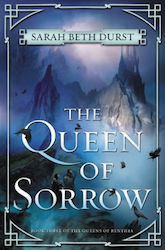 The concluding chapter of the Queens of Renthia trilogy plunges the countries of Semo and Aratay into bloody, desperate war. Queen Naelin of Aratay is informed that Queen Merecot of Semo has kidnapped her children, and is forced to negotiate for their safety and release. This complicates the plans of her fellow queen Daleina, who hopes for an end to the endless depravations of nature spirits who want to exterminate humanity. Naelin isn’t the sort to negotiate, and Merecot has bigger plans than simply going to war with her rivals to the south. As all forces, human and otherwise, muster for an epic confrontation, the kingdoms are brought to the brink of chaos. With a story focused on powerful women and worldbuilding worthy of Guy Gavriel Kay, this series has been a dark delight.
The concluding chapter of the Queens of Renthia trilogy plunges the countries of Semo and Aratay into bloody, desperate war. Queen Naelin of Aratay is informed that Queen Merecot of Semo has kidnapped her children, and is forced to negotiate for their safety and release. This complicates the plans of her fellow queen Daleina, who hopes for an end to the endless depravations of nature spirits who want to exterminate humanity. Naelin isn’t the sort to negotiate, and Merecot has bigger plans than simply going to war with her rivals to the south. As all forces, human and otherwise, muster for an epic confrontation, the kingdoms are brought to the brink of chaos. With a story focused on powerful women and worldbuilding worthy of Guy Gavriel Kay, this series has been a dark delight.
The Oddling Prince, by Nancy Springer
(May 15, Tachyon—Paperback)
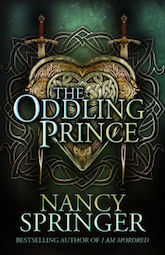 The King of Calidon lies on his deathbed, suffering the ill effects of a magical ring on his finger that cannot be removed. A young fey boy arrives at the castle with claims he can help the king, and a confession that he knows the origins of the cursed object: the king was captured by the queen of Elfland long ago, and kept prisoner in her world. When he wished to return home, the queen sent him back to the precise moment he’d been captured, removing all his memories of his captivity—and of the young son he fathered with the queen—none other than the fae boy, Albaric. Albaric is dismayed to find the king really doesn’tremember him, and regards him with dislike and distrust. Doomed to be an oddling in a mortal world, Albaric sets out to find his place, with help from his half-brother Aric, the king’s human son. Springer is the author of more than 50 books for children and adults; this one hits the sweet spot between them, a richly written story of two young men finding their true paths.
The King of Calidon lies on his deathbed, suffering the ill effects of a magical ring on his finger that cannot be removed. A young fey boy arrives at the castle with claims he can help the king, and a confession that he knows the origins of the cursed object: the king was captured by the queen of Elfland long ago, and kept prisoner in her world. When he wished to return home, the queen sent him back to the precise moment he’d been captured, removing all his memories of his captivity—and of the young son he fathered with the queen—none other than the fae boy, Albaric. Albaric is dismayed to find the king really doesn’tremember him, and regards him with dislike and distrust. Doomed to be an oddling in a mortal world, Albaric sets out to find his place, with help from his half-brother Aric, the king’s human son. Springer is the author of more than 50 books for children and adults; this one hits the sweet spot between them, a richly written story of two young men finding their true paths.
In the Region of the Summer Stars, by Stephen R. Lawhead
(May 15, Tor Books—Hardcover)
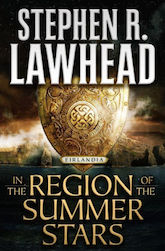 The first book in Lawhead’s Eirlandia series introduces the titular island, ruled by Celtic tribes under the loose authority of a High King who has issued a call for unity against the threat of invasion by the barbaric Scálda. Conor is the first-born of king Ardan mac Orsi, and should by rights be his heir, but a birthmark makes him unsuitable to the superstitious tribesmen. When Conor witnesses the Scálda kidnapping a beautiful, otherworldly woman he believes to be a faéry, he embarks on a quest to both prove himself to his people and find out what the Scálda are up to—if they can master the faéry’s magic, Eirlandia is doomed.
The first book in Lawhead’s Eirlandia series introduces the titular island, ruled by Celtic tribes under the loose authority of a High King who has issued a call for unity against the threat of invasion by the barbaric Scálda. Conor is the first-born of king Ardan mac Orsi, and should by rights be his heir, but a birthmark makes him unsuitable to the superstitious tribesmen. When Conor witnesses the Scálda kidnapping a beautiful, otherworldly woman he believes to be a faéry, he embarks on a quest to both prove himself to his people and find out what the Scálda are up to—if they can master the faéry’s magic, Eirlandia is doomed.
Wrath of Empire, by Brian McClellan
(May 15, Orbit—Hardcover)
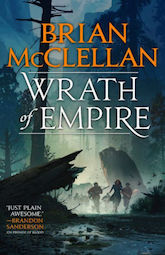 McCellan’s sequel to Sins of Empire dives back into the bloody tale of the Dynize Empire’s invasion of Fatrasta, a war started to celebrate a reunified empire and gain access to the godstones, powerful artifacts that will enable the Dynize to literally create a new god. Taniel Two-shot, who has himself killed a god and thus acquired incredible powers, is back, as is Ka-Poel, a bone-eye sorcerer, standing in opposition to the Dynize threat. Taniel comes across General Vlora Flint and her Riflejack mercenaries as they safeguard refugees from the invasion, while Ka-Poel joins up with the Mad Lancers, formerly invincible soldiers under the command of Colonel Ben Styke. The combined forces seek to locate the godstones before the Dynize, even as espionage and skulduggery back at the capital further complicates matters.
McCellan’s sequel to Sins of Empire dives back into the bloody tale of the Dynize Empire’s invasion of Fatrasta, a war started to celebrate a reunified empire and gain access to the godstones, powerful artifacts that will enable the Dynize to literally create a new god. Taniel Two-shot, who has himself killed a god and thus acquired incredible powers, is back, as is Ka-Poel, a bone-eye sorcerer, standing in opposition to the Dynize threat. Taniel comes across General Vlora Flint and her Riflejack mercenaries as they safeguard refugees from the invasion, while Ka-Poel joins up with the Mad Lancers, formerly invincible soldiers under the command of Colonel Ben Styke. The combined forces seek to locate the godstones before the Dynize, even as espionage and skulduggery back at the capital further complicates matters.
The Thousand Deaths of Ardor Benn, by Tyler Whitesides
(May 15, Orbit—Paperback)
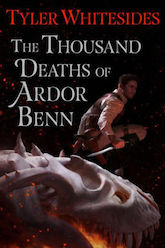 In a world where magical “grit” must be collected in unique ways—for example, feeding precious jewels to a dragon and collecting the, er, biological results—Ardor Benn fancies himself long past his harvesting days. And where others look at him and see a con artist and a thief, he prefers to see himself as a “Ruse Artist Extraordinaire,” skilled in pulling of complicated schemes and a master of deceit. When he’s hired to steal a king’s crown jewels so they can be fed to a dragon and made into a particularly powerful batch of magical grit, he assembles an Ocean’s 11-style team of forgers, thieves, dissemblers, and con artists to pull off the job. Even as they plan their audacious crime, it becomes clear there’s much more at stake than simple larceny and a good payday. In fact, Ardor begins to think he and his team of criminals may be the only thing standing in the way of the end of the world. This one is for all you fans of Scott Lynch and Marshall Ryan Maresca eager to meet your next favorite fantasy ne’er-do-well.
In a world where magical “grit” must be collected in unique ways—for example, feeding precious jewels to a dragon and collecting the, er, biological results—Ardor Benn fancies himself long past his harvesting days. And where others look at him and see a con artist and a thief, he prefers to see himself as a “Ruse Artist Extraordinaire,” skilled in pulling of complicated schemes and a master of deceit. When he’s hired to steal a king’s crown jewels so they can be fed to a dragon and made into a particularly powerful batch of magical grit, he assembles an Ocean’s 11-style team of forgers, thieves, dissemblers, and con artists to pull off the job. Even as they plan their audacious crime, it becomes clear there’s much more at stake than simple larceny and a good payday. In fact, Ardor begins to think he and his team of criminals may be the only thing standing in the way of the end of the world. This one is for all you fans of Scott Lynch and Marshall Ryan Maresca eager to meet your next favorite fantasy ne’er-do-well.
American Hippo, by Sarah Gailey
(May 22, Tor.com Publishing—Paperback)
 This bind-up includes two novellas and related short stories set in an alternate 19th century in which hippos run wild through the American southeast, having been introduced to the swamps of the Mississippi as an alternative source of meat (a scenario based on a real-life plan that never came to be in our reality. An unscrupulous businessman sets the hippos free in southern Louisiana as part of his own plans for local dominance, and the beasts soon become a huge problem only Winslow Houndstooth and his diverse team of criminals and gunslingers can solve. The hippo wranglers embark on a wild adventure that tests their mettle against the surprisingly deadly hippopotami.
This bind-up includes two novellas and related short stories set in an alternate 19th century in which hippos run wild through the American southeast, having been introduced to the swamps of the Mississippi as an alternative source of meat (a scenario based on a real-life plan that never came to be in our reality. An unscrupulous businessman sets the hippos free in southern Louisiana as part of his own plans for local dominance, and the beasts soon become a huge problem only Winslow Houndstooth and his diverse team of criminals and gunslingers can solve. The hippo wranglers embark on a wild adventure that tests their mettle against the surprisingly deadly hippopotami.
The Testament of Loki, by Joanne M. Harris
(May 22, Saga Press—Hardcover)
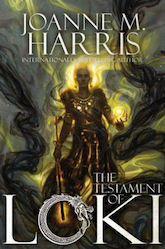 Norse god Loki is trapped in a sort of hellish purgatory in the wake of Ragnarok in Harris’ sequel to The Gospel of Loki. Desperate for a way out, he discovers that humans in the Ninth World—Earth, that is—still believe in the gods to a certain extent, which gives him and his fellow dieties, including his brothers Thor and Odin, an avenue of escape. Loki soon finds himself sharing the mind of a teenage girl named Jumps, who is disappointed and irritated at his presence (she was hoping for Thor). Thor, meanwhile, has found his way into the mind of a dog, and isn’t displeased with this turn of events. Odin and Freya take up residence in two of Jump’s friends—and Odin develops a plan to put the Norse gods back on top. Living up to his reputation, Loki immediately begins to gum up the works. These aren’t exactly the gods of legend, nor of Marvel, for that matter, but they are supremely entertaining to read about, and Loki’s narrative voice is irresistible.
Norse god Loki is trapped in a sort of hellish purgatory in the wake of Ragnarok in Harris’ sequel to The Gospel of Loki. Desperate for a way out, he discovers that humans in the Ninth World—Earth, that is—still believe in the gods to a certain extent, which gives him and his fellow dieties, including his brothers Thor and Odin, an avenue of escape. Loki soon finds himself sharing the mind of a teenage girl named Jumps, who is disappointed and irritated at his presence (she was hoping for Thor). Thor, meanwhile, has found his way into the mind of a dog, and isn’t displeased with this turn of events. Odin and Freya take up residence in two of Jump’s friends—and Odin develops a plan to put the Norse gods back on top. Living up to his reputation, Loki immediately begins to gum up the works. These aren’t exactly the gods of legend, nor of Marvel, for that matter, but they are supremely entertaining to read about, and Loki’s narrative voice is irresistible.
84K, by Claire North
(May 22, Orbit—Paperback)
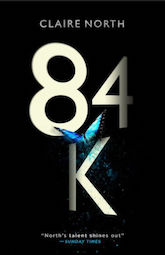 North latest presents a chilling future England that operates by corporate rules and in which all crimes are dealt with via fines and indentured servitude. If you break the law, the Criminal Audit Office assesses the value of the crime—say, £780 for sexual harassment. If you can pay the fine, that’s the end of it. If you can’t, you must work to pay off the debt. Theo Miller works for the Audit Office, so he knows what the fine is when he stumbles on the murder of his ex-girlfriend, Dani: £84,000. Dani had been investigating the crimes of the Company that runs everything, and paid for her fearlessness with her life. When Dani’s last breath is used to inform Theo that he’s the father of her daughter, he decides to continue Dani’s work, doggedly pursuing those who paid to have her killed. Told in an unusual, challenging narrative voice, 84K paints a bleak picture of a world where everything has a price and nothing has value.
North latest presents a chilling future England that operates by corporate rules and in which all crimes are dealt with via fines and indentured servitude. If you break the law, the Criminal Audit Office assesses the value of the crime—say, £780 for sexual harassment. If you can pay the fine, that’s the end of it. If you can’t, you must work to pay off the debt. Theo Miller works for the Audit Office, so he knows what the fine is when he stumbles on the murder of his ex-girlfriend, Dani: £84,000. Dani had been investigating the crimes of the Company that runs everything, and paid for her fearlessness with her life. When Dani’s last breath is used to inform Theo that he’s the father of her daughter, he decides to continue Dani’s work, doggedly pursuing those who paid to have her killed. Told in an unusual, challenging narrative voice, 84K paints a bleak picture of a world where everything has a price and nothing has value.
Twelve Tomorrows, edited by Wade Roush
(May 25, MIT Pres—Paperback)
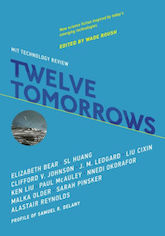 The latest entry in the anthology series exploring how emerging technologies might shape our future boasts an all-star lineup of short fiction masters. Ken Liu has a Black Mirror-ish take on cryptocurrency; J.M. Ledgard explores concepts of loneliness and solitude as experienced by the fascinating mind of a nearly-30,000-year-old artificial intelligence; Elizabeth Bear wonders how a “smart home” might be manipulated into acting against its owners. These and nine other stories—by the likes of L. Huang, Clifford V. Johnson, Liu Cixin, Paul McAuley, Nnedi Okorafor, Malka Older, Sarah Pinsker, and Alastair Reynolds—give us a glimpse of futures that are funny, dark, exciting, and horrifying.
The latest entry in the anthology series exploring how emerging technologies might shape our future boasts an all-star lineup of short fiction masters. Ken Liu has a Black Mirror-ish take on cryptocurrency; J.M. Ledgard explores concepts of loneliness and solitude as experienced by the fascinating mind of a nearly-30,000-year-old artificial intelligence; Elizabeth Bear wonders how a “smart home” might be manipulated into acting against its owners. These and nine other stories—by the likes of L. Huang, Clifford V. Johnson, Liu Cixin, Paul McAuley, Nnedi Okorafor, Malka Older, Sarah Pinsker, and Alastair Reynolds—give us a glimpse of futures that are funny, dark, exciting, and horrifying.
Vicious, by V.E. Schwab
(May 29, Tor Books—Paperback)
 Before V.E. Schwab found breakout success with the Shades of Magic trilogy, she released Vicious, her debut novel for adult readers, which explores and subverts comic book tropes with all the ferocity the title implies; it’s being rereleased with a new cover in the lead-up to the long-in-coming sequel, Vengeful. Victor and Eli are two driven, unhappy young men who meet as roommates in college. Recognizing similar drives in one another, they combine their research efforts into abilities that can be unlocked via manipulation of adrenaline, ultimately cracking a code that allows them to each acquire what can best be described as superpowers. Victor winds up in prison, and Eli goes down an even darker path, determined to identify and eliminate other super-powered humans he considers to be “unnatural”—including a young girl named Sydney, who has the power to raise the dead. The narrative opens in the wake of Victor’s prison break, as he and Sydney team up to take Eli down, and the story hops back and forth in time, only coming fully into focus at the end. There are no heroes here, only flawed, broken people trying to do what they believe is right—no matter the cost.
Before V.E. Schwab found breakout success with the Shades of Magic trilogy, she released Vicious, her debut novel for adult readers, which explores and subverts comic book tropes with all the ferocity the title implies; it’s being rereleased with a new cover in the lead-up to the long-in-coming sequel, Vengeful. Victor and Eli are two driven, unhappy young men who meet as roommates in college. Recognizing similar drives in one another, they combine their research efforts into abilities that can be unlocked via manipulation of adrenaline, ultimately cracking a code that allows them to each acquire what can best be described as superpowers. Victor winds up in prison, and Eli goes down an even darker path, determined to identify and eliminate other super-powered humans he considers to be “unnatural”—including a young girl named Sydney, who has the power to raise the dead. The narrative opens in the wake of Victor’s prison break, as he and Sydney team up to take Eli down, and the story hops back and forth in time, only coming fully into focus at the end. There are no heroes here, only flawed, broken people trying to do what they believe is right—no matter the cost.
This post was published simultaneously on the B&N Sci-Fi and Fantasy Blog.
See the best books from previous months here.










